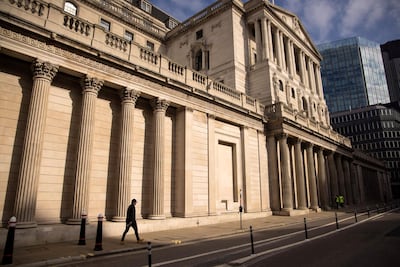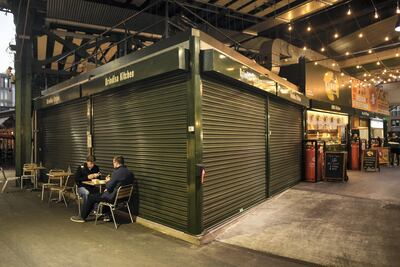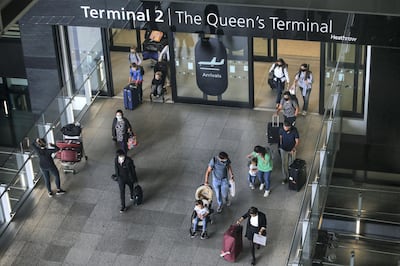It has been a year since Britain first went into lockdown and while the country can now see light at the end of the tunnel thanks to its rapid vaccination programme, the cost of the pandemic has been devastating.
Prime Minister Boris Johnson’s first “stay-at-home” order on March 23, 2020 was followed by two more lockdowns for much of the country, as well as a series of complicated social distancing rules.
This has seen the UK pay a hefty economic price for Covid-19, which has infected more than 4.3 million Britons and caused the death of more than 126,000 – the highest toll in Europe and the fifth highest in the world.
Here we outline the numbers that highlight the real financial cost 12 months of curbs have had on the UK economy:
Total cost of Covid set to hit £407bn
UK finance minister Rishi Sunak was quick to react with economic support measures at the start of the first lockdown last year.
Since then, he has recalibrated and extended his support measures on a number of occasions to try and ensure individuals and businesses can survive the financial hit the pandemic has delivered.

In his most recent budget statement, Mr Sunak vowed to do "whatever it takes" to reboot the economy, including extensions to the Job Retention Scheme, a stamp duty holiday for property investors and business rates exemptions for retail, hospitality and leisure companies.
This amounted to an extra £65 billion ($89.08bn) in Covid support measures, taking the total fiscal support for the crisis for this year and next to £407bn, with £352bn spent so far.
Pandemic cost to business activity: £251bn
A year of Covid-19 lockdowns has cost the UK economy £251bn – equivalent to nearly twice the annual output of Scotland, according to the Centre for Economics and Business Research.
The study showed that coronavirus was the main cause of the reduction in the UK’s gross value added (GVA), a figure that measures the value of goods and services produced by the economy minus the costs of inputs and raw materials needed to deliver them.
Covid-19 losses across the country were the highest in London, with £51.4bn of lost activity in the capital, the Cebr study found.
£895bn of stimulus pumped into the economy

The Bank of England has ramped up its bond-buying programme since the start of the crisis, doubling its quantitative easing from £445bn a year ago to the £895bn planned by the end of this year.
Stepping up the bond-buying programme has helped to cushion Britain’s economy amid the cycle of lockdowns.
At its latest monetary policy committee meeting last week, the BoE pledged to keep its stimulus at the same level and maintain the pace of its government bond purchases of about £4.4bn a week, "with flexibility to slow the pace of purchases later".
However, the lender said the road ahead remains unclear as vaccination efforts are beset by rows with the European Union over supply and safety issues.
Public sector borrowing set to swell to £355bn
Public debt is expected to hit £355bn by the end of the fiscal year, according to the Office for Budget Responsibility.
In February, £19.1bn was added to the government's borrowing total, taking the budget deficit in the first 11 months of the financial year to almost £279bn - the highest level since the Second World War and almost six times the amount borrowed in the same period a year earlier.
While the £19.1bn appears huge when compared with £1.6bn for the same month a year earlier, just before the pandemic took hold, economists now expect borrowing for the full financial year to be about £20bn below the OBR’s forecast. Britain’s speedy vaccination programme, as well as the country learning to adapt to the crisis, has helped to ease the burden.
That means Mr Sunak may not decide to take drastic measures in the future, such as imposing a raft of tax hikes to repay the debt.
Net debt climbed to £2.13tn
While the borrowing level may not be as high as feared, the net debt level is still eye-wateringly high.
Total state debt currently stands at £2.13 trillion as of February, equivalent to 97.5 per cent of Britain's total gross domestic product, a level not seen since the early 1960s when the UK was still recovering from the Second World War.
Borrowing in the next financial year, which starts in April, is estimated to fall to £234bn, according to the OBR, but that is still more than four times the deficit in 2019-20.
Britain’s economy contracted 9.9% in 2020
Britain suffered an economic contraction of 9.9 per cent last year – its biggest decline in 300 years after the government closed workplaces, businesses and shops at the start of the lockdown.
When restrictions eased in the summer, business activity enjoyed a brief bounce before the number of Covid cases started to rise again in the autumn, leading to a second lockdown in England in November and a third in January.
It meant Britain's economy continued to contract in January, by 2.9 per cent, while exports to the European Union slumped by 40 per cent in the first month following the UK's exit from the economic bloc.
The decline in exports represents £5.6bn ($7.8bn) in lost trade, with imports also down, plunging 28.8 per cent or £6.6bn in the first month since the start of new trading rules between the UK and EU.
Unemployment set to peak at 6.5%
While Britain's unemployment rate unexpectedly fell to 5 per cent in the three months to January, despite many parts of the country entering a third Covid-19 lockdown, the outlook is not rosy.
In February, there were almost 700,000 fewer people on payrolls compared with February last year, indicating a large fall in employment since the start of the crisis with two-thirds of that decline made up of people under 25.
The BoE expects a sharp contraction in output in the first quarter and forecasts that unemployment will peak at 6.5 per cent later in the year.
Some economists are less gloomy, with Ruth Gregory of Capital Economics expecting the jobless rate to peak at 6 per cent by early 2022.
“That would be a much better result than most feared only a few months ago,” she said.
Pandemic hit to SMEs to exceed £126.6bn
The impact of Covid-19 on Britain’s small-to-medium enterprises will exceed £126.6bn, according to a study by small business insurer Simply Business, almost double the £69bn expected a year ago.
SMEs have lost £15,673 on average since the start of the first lockdown last year, with that figure expected to reach £22,461 in the coming months.
More than 840,000 SMEs do not believe their business will ever return to pre-pandemic levels and 81 per cent said they felt they had not received enough government support.
There are six million SMEs in the UK, accounting for 99 per cent of all businesses, 33 per cent of employment and 21 per cent of total economic turnover.
Despite this, 2.2 million companies said they had not been able to access government support or grants since the start of the crisis.
Hospitality and retail sectors shed almost 700,000 jobs

Sectors hardest hit by the pandemic are those where social distancing measures are the most needed, such as hospitality and retail.
Non-essential shops, restaurants and pubs have been closed during all three English lockdowns, with many workers either being furloughed or losing their jobs.
As a result, British retail sales plunged 8.2 per cent in January from December - the second largest slump in volumes on record after the fall in April at the start of the pandemic, with department and clothing store sales particularly affected.
The retail sector suffered 67,000 job losses between December 2019 and December 2020, according to the Office for National Statistics, with men losing 11,000 of those jobs and women 56,000.
Helen Dickinson, chief executive of the British Retail Consortium, said while the second wave of the pandemic swept away tens of thousands of retail jobs, the government’s furlough scheme now supports 600,000 retail workers, a rise of 200,000 since December.
The hit to employment in the hospitality sector was even higher, with 600,000 jobs lost, according to trade body UK hospitality, as more than 12,000 businesses closed and sales dropped by £86bn.
“The last 12 months have been truly awful for our sector. While any restrictions remain in place, our pubs and restaurants can only break even and the viability of thousands remains at risk,” said UK Hospitality chief executive Kate Nicholls.
Housing sector saw 9.5% decline in transactions
Britain’s housing sector experienced a 9.8 per cent decline in transactions in the year to January 2021, compared with the previous 12 months, according to HM Revenue and Customs.
This was mainly caused by the property market being shut during the country’s first lockdown, the equivalent of 15 per cent of 2020.
However, unlike during the 2008-09 economic downturn, house buyers were not deterred, with average house prices soaring while the wider economy shrank.
Last year, house prices grew 8.5 per cent, with the average house price reaching a record high of £252,000, according to the ONS.
The surge was spurred by Rishi Sunak’s stamp duty land tax holiday, which wiped out the levy on house purchases up to the value of £500,000, with the break extended in the recent budget until the end of June.“Sales have been buoyed by people looking for more space," said Tom Bill, head of UK residential research at property consultancy Knight Frank.
“Ultra-low interest rates have also played a significant role in the background. These factors will support transaction numbers when the stamp duty holiday tapers away and buyers stop planning for future lockdowns.”
House prices rose again in February, with annual growth of 6.9 per cent, up from 6.4 per cent in January, according to lender Nationwide.
Heathrow suffers 92% drop in passenger numbers
The number of passengers arriving at Heathrow airport was down 92 per cent in February when compared with the same month a year earlier.
Just 461,000 passengers arrived or departed over the month, the lowest level since 1966. The London airport typically handles more travellers than that in just two days.
February was the first full month since the third lockdown began in England, a period that also saw the introduction of a hotel quarantine scheme for arrivals from 33 “red list” countries.
Heathrow has been hit particularly hard by the pandemic since it relies on long-haul markets that have been all but wiped out. Last month, the airport posted a £2bn loss for 2020 after passenger numbers tumbled 73 per cent, a decline that is reflected across the country’s aviation sector.
Uneven hit to wealth: 6m 'accidental savers’ versus 9m borrowing more
More than six million people have become "accidental savers" during the pandemic by keeping their jobs while facing lower expenses because of the Covid restrictions, according to financial consultancy LCP.
British workers aged between 35 and 44 have benefitted the most, each setting aside an average of £2,674 in cash during the crisis, according to Wesleyan, a financial adviser.
The Bank of England estimated that from May to November alone, British households built up an extra £125bn in savings - five times as much as in any other nine-month period in history.
Conversely, millions of people have seen their finances hit hard by Covid, particularly those already on lower incomes, with higher energy and food bills and a 20 per cent cut in income while on furlough contributing to the squeeze.
More than nine million people had to borrow more than they usually would by the end of 2020 because of the crisis, the ONS said.
Up to 1.3m foreigners left the UK in the 12 months to January
The number of people living in the UK has fallen significantly during the crisis with one study estimating up to 1.3 million foreigners left the UK in the 12 months ending in January.
Almost 700,000 non-UK born workers exited London alone, according to the report from the Economic Statistics Centre of Excellence.
A similar study from the University of Oxford said about 400,000 to 600,000 people had departed, with younger working-age people in their 20s and 30s leaving in the greatest numbers.
However, both researchers said there was huge uncertainty about their estimates.
The ONS Labour Force Survey, however, estimates that 893,000 non-UK residents left the UK during the pandemic.













